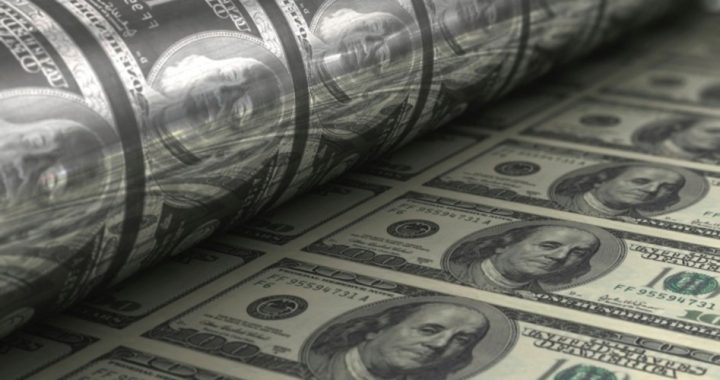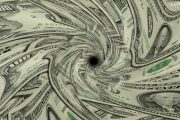
With the U.S. Senate’s rejection of Rand Paul’s latest attempt to force the Federal Reserve to open its books for a congressional audit, that super-secret corporation’s control over the country’s supply of currency will continue without oversight.
As reported by The New American’s Alex Newman on the day after the vote:
Democrats and one Republican in the U.S. Senate joined forces on January 12 to protect the secretive central bank from transparency and accountability, voting down the enormously popular “Audit the Fed” legislation that would have opened up the controversial bank’s books to government auditors.
There is no way that the corporatists in control of the currency of the United States of America are going to give even a glancing look at its operations to the representatives of the people whose economics lives they’ve manipulated without meddling for over a century.
Given the federal government’s drive to co-mingle the money of the U.S. Treasury with that of third-world countries of Asia and Europe as part of the Trans-Pacific Partnership (TPP) and Transatlantic Trade and Investment Partnership (TTIP), it is urgent that the American people persuade their elected representatives to force the Fed to own up to the damage it and the shadowy coterie of global bankers who own it have done to the economic wellbeing of the United States.
First, the unelected governors of the unconstitutional central bank have an absolute stranglehold and monopoly over the flow of our nation’s money and credit. Not once since its inception in 1913 has there ever been a thorough audit or an accounting to Congress about its activities.
During its century-long reign over the financial wellbeing of our country, the Federal Reserve has manipulated our currency until it is nearly worthless. Meanwhile, Congress turns a blind eye and a deaf ear to the crisis and the calls to control it.
The fact is that since that day in 1913, the dollar has lost over 95 percent of its purchasing power. Most, if not all, of this precipitous decline was caused by the monetary policy of the Federal Reserve.
Adding insult to injury, during testimony to Congress in 2009, Ben Bernanke refused to reveal to committee members the names of the institutions that received trillions of dollars in bailout money from the Fed. Later, he told our elected representatives that he would not disclose the identity of the foreign banks that were parties to sweetheart deals with the Federal Reserve.
When it comes to the central bank and its machinations, the fix is in. The Fed — ostensibly a non-profit organization — owns the mint, the money, and sets the terms of the loans it makes to the federal treasury. What’s more, there is no product; there is nothing being loaned other than worthless paper that can never be traded in for anything of value because all that is used to secure the worth of the currency is now owned by the very bankers who control the Federal Reserve.
And the Fed will continue to accumulate power. There is no limit to the lengths global bankers will go to in order to control the population of the world. There is no hope of regulating restraint. Power of this magnitude operates beyond the reach of regulations.
As it has since 1958, The John Birch Society offers Americans a well-established, experienced, and influential way of organizing with like-minded constitutionalists who demand the Federal Reserve be not only audited but also abolished. A statement from The John Birch Society declares the group’s position:
The powers of Congress are described in Article I, Section 8 of the Constitution, and the creation of a central bank like the Federal Reserve is not listed as one of those powers. The Federal Reserve is charged with protecting the value of the dollar through managing our nation’s monetary policy. However, since its inception in 1913, the dollar has lost 95 percent of its value under the Federal Reserve’s monetary oversight. The John Birch Society advocates abolishing the Federal Reserve.
Through the recent efforts of Rand Paul, the efforts of his father Ron, and the nearly six decades of leadership by The John Birch Society, the issue of Federal Reserve oversight has been brought to the public’s awareness. The fact remains, however, that we are no closer to enforcing constitutional limits on the country’s monetary policy then we were in 1913.
Equally irrefutable is the fact that the past is prologue and if something isn’t done soon to return the power of coining money to the legislative branch as mandated in the Constitution, the United States will follow the path of economic mayhem down which all such societies have been similarly driven.
The Founding Generation learned the hard way about the economic disasters associated with paper money and the hyper-inflation or default of debts that unbacked currency creates.
Thomas Jefferson remembered those days, and in 1813 he warned, “Paper money is liable to be abused, has been, is, and forever will be abused, in every country in which it is permitted.”
This is precisely the reason why the men who drafted the Constitution empowered Congress to mint gold and silver — sound money — and why they included not a single syllable authorizing the legislature to surrender that critical power to a plutocracy with a penchant for printing fiat (unbacked) money.
An article published by the Sound Money Defense League earlier this month rehearsed a little of the history of the propensity of the American Establishment to ignore the lessons of the financial disorder of the decades before and after the War for Independence and to lean on the familiar and fragile crutch of fiat money:
Abraham Lincoln financed the Civil War in part by debasing the currency. By 1863, inflation ran rampant in the North and in the Confederacy. The Confederate States of America dollar was backed by nothing but the hope that it would retain its value in the event of a Southern victory. Today, Confederate dollars aren’t worth anything except their historical value to collectors — another in a long line of fiat currencies that failed.
In the aftermath of the carnage wrought by the Civil War, America entered into an extended period of economic ascent marked by stable price levels. The U.S. dollar, backed by gold, became King Dollar. Not until World War I did high rates of inflation return.
The administration of Franklin D. Roosevelt ushered in an era of Progressive policies that ruined the country’s economy and firmly planted the Republic on the cornerstones of Progressive ideology: a central bank, personal income tax, and a slate of “entitlements” that would create a class of Americans dependent on the federal government.
Stefan Gleason, president of the Sound Money Defense League, identified these developments as the milestones along the road to economic ruin. “It would not have been possible for the government to accrue more than $200 trillion in unfunded liabilities without the twofer of a central bank and a fiat currency. The U.S. dollar didn’t become fully fiat until 1971, when President Nixon suspended gold redeemability [sic]. That’s when growth in the national debt became completely unconstrained,” he wrote.
Historically, nations running up the kind of debt the United States has accumulated soon fall into the trap of cranking up the printing press and paying debts with unbacked paper, a situation that typically results in hyperinflation and riots.
The hope is that the people of the United States will break that printing press and force a return to the sound money policies of the past, returning this Republic to the firm financial foundation upon which it was meant to be built and away from the taxing and spending of Congress and the secrecy of the Federal Reserve.



